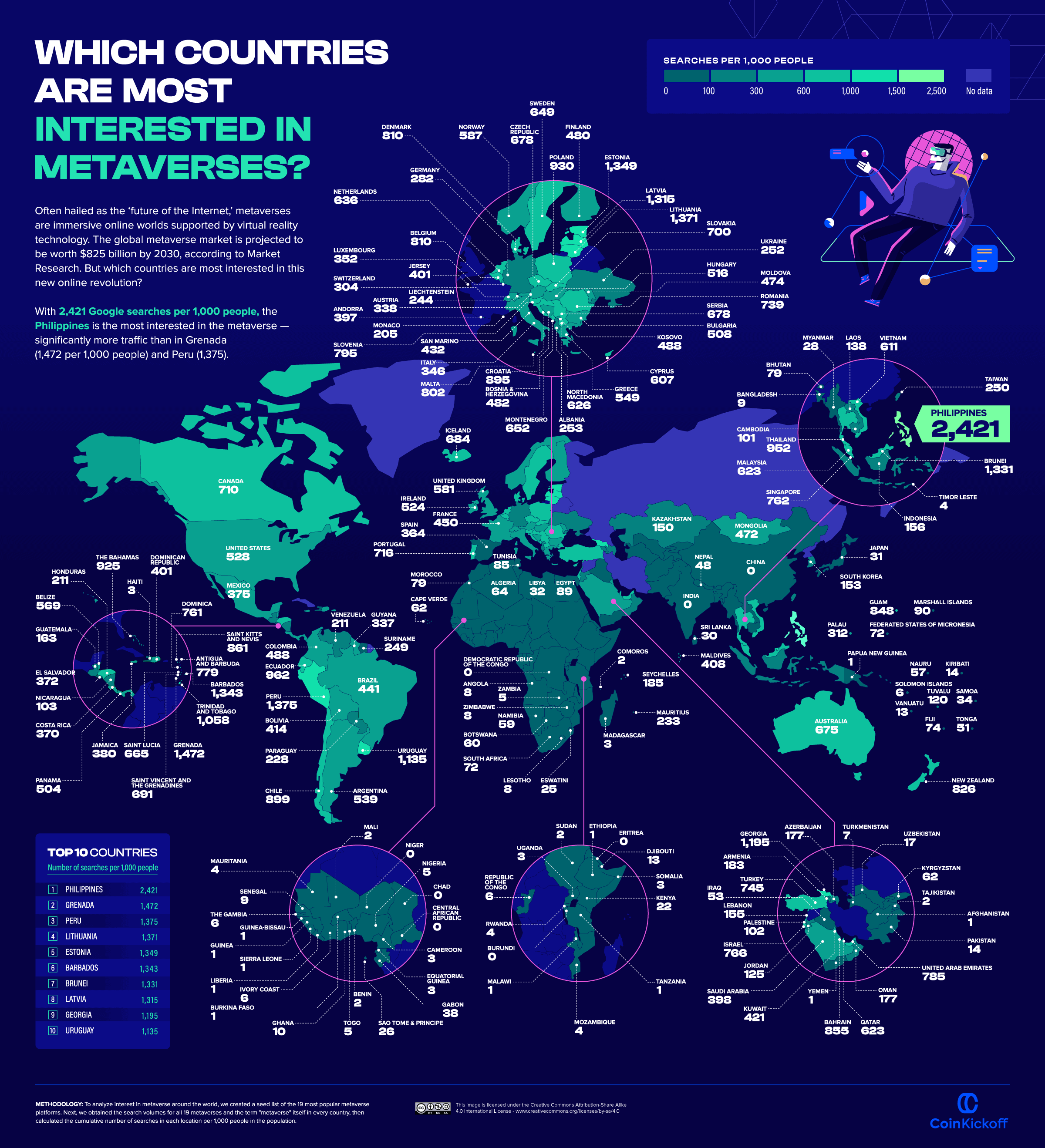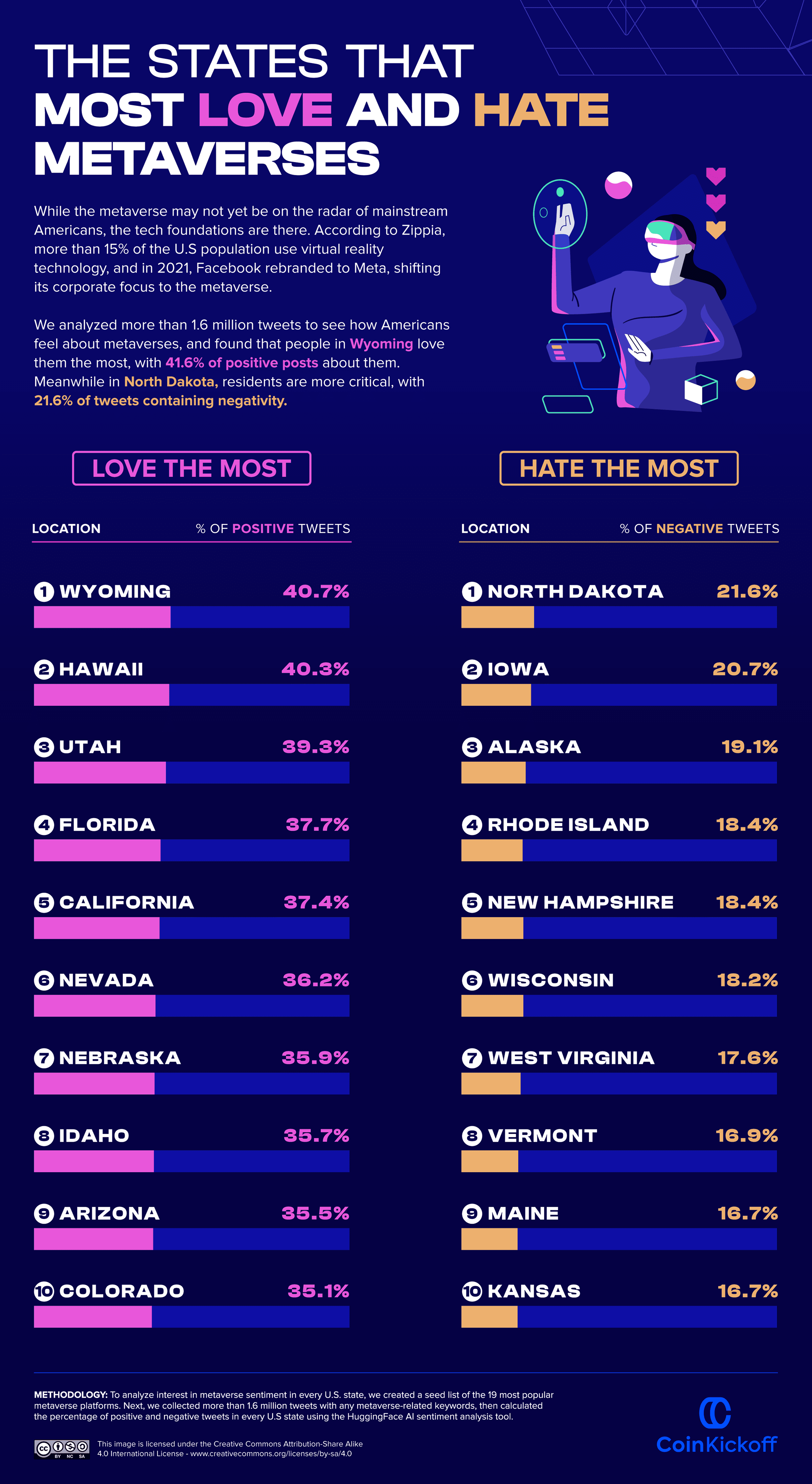
In October 2021, Mark Zuckerberg announced that Facebook would be rebranding. Earlier in the year, Facebook had become just the sixth company in the world to reach a market cap of $1 trillion, following a surge in its user base during the Covid-19 pandemic. The business adopted the name ‘Meta’ to reflect a shift in focus towards the metaverse — an immersive virtual world made possible by virtual reality (VR) and augmented reality (AR) technology.
While the concept has its origins in 1990s science fiction, Zuckerberg himself is credited with bringing the debate around the metaverse into the mainstream. Facebook acquired VR platform Oculus for $2 billion in 2014, with the hope of pioneering metaverse technology and laying the foundation for widespread adoption among the general public.
However, investors are yet to be convinced of Zuckerberg’s strategy. And in 2022, the company lost 70% of its stock value. Despite Meta’s struggles, interest and investment in the metaverse are flourishing. According to McKinsey reports, at least $120 billion has been raised for emerging technology in the space. And it believes the sector has the potential to generate as much as $5 trillion in value by 2030.
While it is capturing the imagination of tech investors, how do people around the world feel about the metaverse? To find out more, Coin Kickoff has done some research to gauge the interest and sentiment towards the metaverse across the world.

- 350+ Cryptocurrencies Listed
- <0.10% Transaction Fees
- 120 million Registered Users
- Secure Asset Fund for Users
- Earn On Deposits

- US Based
- Start with as little as $10
- Buy and sell 200+ cryptocurrencies
- Pro Solution for larger traders
- Available in 190+ countries
What We Did
In order to find out which countries and U.S. states are most interested and supportive of metaverses, we analyzed 1.6 million tweets and 19 of the most popular metaverses. We also ascertained Google search volumes for metaverse-related keywords in 192 countries, as well as a visual comparison of metaverse worlds such as Decentraland to real-life places.
Key Findings
- People in the Philippines are most interested in the metaverse, with 2,421 Google searches for it per 1000 people.
- Florida residents are most keen to explore the metaverse, with 670 searches per 1,000 people.
- Vietnamese people are most positive about the metaverse, with 56.8% of Twitter posts about the virtual words in favor of them.
- With 14.4% of tweets containing negativity towards the metaverse, Irish residents are most skeptical about the concept.
Filipinos are the World’s Most Interested People in the Metaverse
While tech entrepreneurs and venture capitalists may be excited about the metaverse, is the feeling shared by people around the world? Research from Gartner predicts that 25% of people will spend at least an hour per day in the metaverse by 2026. With the potential to revolutionize how people interact with each other online, it’s natural for there to be some excitement about it.
Click here to see the image in full size
Our research shows that people in 193 countries are searching on Google for metaverse-related terms, and of those, people in the Philippines are most interested — with 2,421 searches per 1,000 people in the country. A business survey found that 89% of professionals would be willing to use the metaverse to enhance their work, with almost half believing it will lead to a more positive and collaborative environment.
The Philippines are among the most enthusiastic when it comes to the metaverse’s development, hosting Asia’s largest metaverse conference in Manila in May 2022. Its tech community is also emerging as one of the continent’s leaders in the space, with a startup community ready to popularize the metaverse in the already-popular gaming sector.
Florida Positions Itself at the Center of the Metaverse — And Locals Are Interested
Meanwhile in the United States, there are early signs of growing interest in the metaverse. Research from McKinsey suggests more than three-quarters of Americans are aware of the metaverse, and 55% use at least one platform using its technology. Among those who have familiarity with it, an Ipsos poll finds that 41% of users are curious, and 35% as excited about its potential.
Click here to see the image in full size
When it comes to interest across the U.S., our research shows that Floridians are most interested in finding out more about metaverses, with 670 searches per 1,000 people in the state. The Sunshine State wants to position itself as the center of the metaverse, with Orlando’s tech cluster seeking to take advantage of its creative and aerospace hubs to drive more than $1bn in local investment. Both Orlando and Miami have used 3D and VR technology to make virtual recreations of their cities in the metaverse.
Support for the Metaverse Highest in South East Asia
If the metaverse is to further enter the mainstream, it will be with the support of Millenials and Gen Z. McKinsey suggests that the youngest two generations are likely to spend as much as five hours per day in the metaverse. The gaming sector is arguably the most enthusiastic about the metaverse, with 52% of users believing it will revolutionize the industry. Online games like Roblox and Fortnite already incorporate elements of the metaverse, with large virtual worlds that allow users to interact with each other and create a sense of community among their player base.
Click here to see the image in full size
Vietnam is one area that has a major opportunity to drive innovation in the metaverse, thanks to an emerging tech cluster with gaming and fintech at its heart. Our research shows that people in Vietnam are most enthusiastic about the metaverse, with 56.1% of Twitter posts about it containing positive messaging.
Five of the ten most positive countries about the metaverse are in Southeast Asia, emphasizing the region’s optimism about extended reality technology. Axie Infinity, one of Vietnam’s most popular metaverse games, had a player base of at least 2.5 million at the start of 2022 and is one of the most exciting prospects in metaverse technology.
West Coast Optimism for the Metaverse Trumps East Coast Negative Sentiment
As global interest in the metaverse gathers pace, Americans, in the main, are still unsure about whether it will benefit them. Just 7% of people in a survey said that the concept makes them “more excited” about the future, and 58% of respondents declared their indifference toward the metaverse. Despite this, our research found positive sentiment in Twitter posts about the concept in all 50 states.
Click here to see the image in full size
Wyoming is the most excited, with positive sentiment in 40.7% of tweets about the metaverse. The state’s relaxed legal stance on autonomous enterprises like cryptocurrency and extended reality make it a safe haven for startups. In 2021, ELOCOIN was the first in Wyoming to harness crypto and traditional wealth creation for use in its metaverse.
Eight of the ten U.S. states most positive about the metaverse were in the west of the country, while five of the ten most negative are on the East Coast. However, North Dakotans are the most pessimistic about the metaverse, with critical sentiment in 21.6% of tweets.
NFT Worlds — The Largest Metaverse is 60% the Size of Brazil
For many early adopters of the metaverse, an extended reality universe where consumers can buy and sell virtual spaces is enticing. Alongside cryptocurrencies and NFTs, people are now exchanging land in the metaverse, with a plot in Decentraland selling for more than $2m in 2021. While traditional realtors catch up to this emerging opportunity, world sizes continue to grow — with retailers and startups alike using virtual spaces to sell goods and services.
To help visualize the scale of many of the metaverse’s largest worlds, we’ve created this helpful guide comparing virtual spaces to real-world locations. For example, NFT Worlds — currently the largest metaverse in existence, has five trillion m2 of exchangeable land, equivalent to 60% of the landmass of Brazil — the world’s fifth largest country.
Click here to see the image in full size
The Metaverse — Web 3.0 or Just a Phase?
Global interest in the metaverse is growing all the time as new opportunities develop to explore its full potential. It is closely linked to the emergence of cryptocurrency, and the two will rely on each other heavily as both concepts continue to develop. You can view our full dataset below, showing how interested each country and U.S. state is in the metaverse.
As a concept, the metaverse is often viewed as a distant ideal seen only within the realms of science fiction. However, the launch of the Oculus Rift headset in 2012 brought virtual reality into the mainstream. With legendary gaming executive John Carmack (of DOOM fame) as the company’s CTO, Oculus took aim at VR gaming — an industry projected to be worth $90bn by 2026.
Facebook’s rebranding to Meta in October 2021 sent shockwaves through the tech industry, only for the company to be mocked online for Meta’s late addition of legs to its character models in the metaverse. It was a personal gamble for CEO Mark Zuckerberg, which saw his personal net worth tumble in 2022. But will he be right in the long run? Is the metaverse the internet’s “next big thing” or the latest superfluous fad in tech? Only time will tell.
Methodology & Sources
To analyze interest in metaverse sentiment around the world, we created a seed list of the 19 most popular metaverse platforms using manual research and the following sites as a guide:
- https://ryanschultz.com/list-of-social-vr-virtual-worlds/
- https://101blockchains.com/best-metaverse-platforms/
- https://www.analyticsinsight.net/top-10-metaverse-platforms-that-enthusiasts-have-to-try-out-in-2022/
- https://www.ajmarketing.io/post/top-11-metaverses-you-should-know
- https://hackernoon.com/the-top-7-metaverses-that-you-can-try-right-now
- https://www.nytimes.com/2021/07/10/style/metaverse-virtual-worlds.html
- https://forkast.news/biggest-players-in-the-metaverse/
- https://www.jatinderpalaha.com/metaverse-platforms/
- https://www.mobileappdaily.com/top-metaverse-platforms
- https://www.business2community.com/cryptocurrency/best-metaverse-platforms
- https://geekflare.com/metaverse-platforms/
- https://www.polygonalmind.com/blog-posts/metaverse-platform-comparison-virtual-worlds-on-the-blockchain
- https://makeanapplike.com/top-metaverse-play-to-earn-games-list/
- https://influencermarketinghub.com/top-metaverse-games/
- https://xpertvr.ca/6-metaverse-platforms/
- https://wealthquint.com/top-metaverse-platforms-27404/
- https://www.bitdeal.net/top-10-metaverse-platforms-2022
- https://www.blockchain-council.org/metaverse/10-best-metaverse-platforms-to-watch-out-in-2022/
Next, using the DataForSEO tool, we obtained the number of search volumes for all 19 metaverses and the term “metaverse” itself in every country and U.S. state. Finally, we calculated the cumulative number of searches in each location per 1,000 people in the population to gauge interest online for the metaverses.
We also collected 1,662,990 tweets with any of these keywords: “metaverse is,” “metaverse are,” “the metaverse,” “metaverses is,” “metaverses are,” “the metaverses.” Following this, we calculated the percentage of positive and negative tweets in every country and state using the HuggingFace AI sentiment tool, with a benchmark of countries with at least 500 tweets.
Sources of the population data:
- https://population.un.org/dataportal/home
- https://www.census.gov/data/datasets/time-series/demo/popest/2020s-state-total.html
The data was collected in September 2022.
Other Popualr Guides
- 3 Best Bitcoin Crypto Casinos With Bonuses
- How to Buy Bitcoin (BTC)
- How to Buy Ethereum (ETH)
- How to Buy Dogecoin (DOGE)
- How to Buy Shiba Inu (SHIB)
- How to Buy Solana (SOL)
- How to Buy Litecoin (LTC)
- How to Buy Polkadot (DOT)
- How to Buy Polygon (MATIC)
- How to Buy Cardano (ADA)
- How to Buy Avalanche (AVAX)






